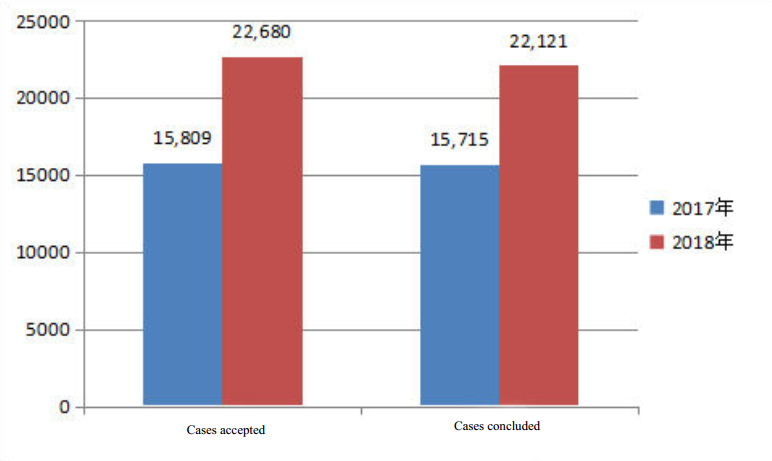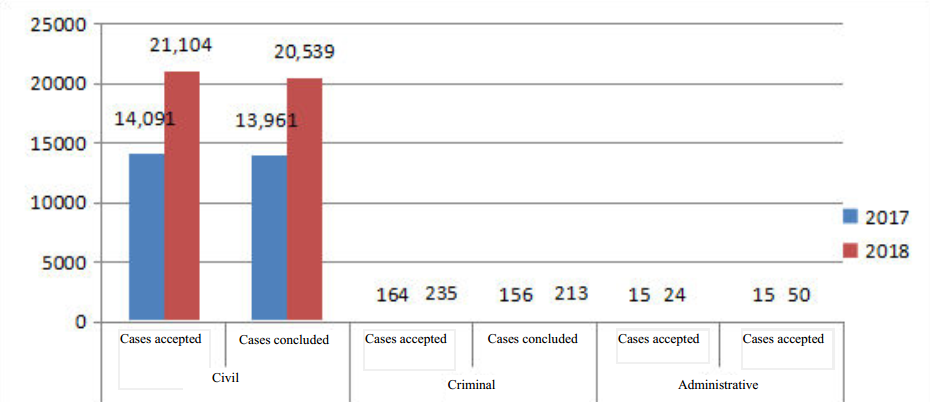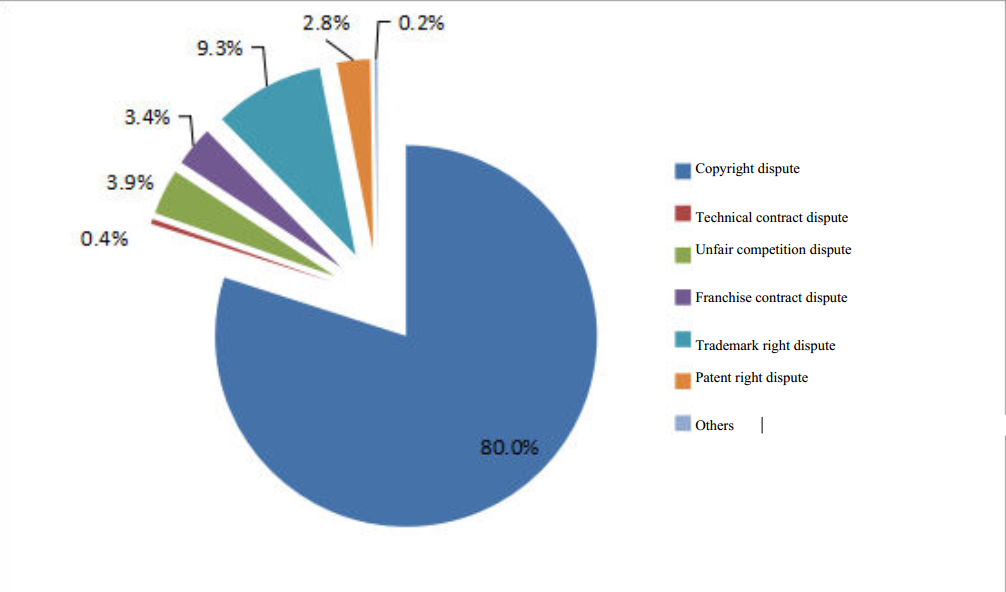White Paper on the Trial of Intellectual Property Cases by Shanghai Courts in 2018
Shanghai High People’s Court
April 22, 2019
Judicial Protection Conditions of Shanghai Courts for Intellectual Property in 2018
In 2018, Shanghai courts, giving full play to the leading role of justice in intellectual property rights protection and conscientiously implementing the judicial policy of “maintaining the leading role of justice, carrying out strict protection, implementing different policies by categories, and pursuing balanced proportions,” heard various intellectual property cases in a fair and efficient manner, kept improving the judicial protection mechanism of intellectual property rights, put forth efforts in optimizing business environment, and deepened foreign exchanges and cooperation. By doing so, new achievements have been made in the judicial protection of intellectual property rights, providing powerful judicial services and guarantees for promoting the innovation-driven development of Shanghai and for building a remarkable global city and a socialist modern metropolis with global influence.
I. General Situation of Intellectual Property Trial
1. The numbers of cases accepted and concluded hit a new record high. In 2018, Shanghai courts accepted a total of 22,680 IP cases and concluded 22,121 IP cases, a significant rise of 43.46% and 40.76% respectively from the previous year (See Figure 1).
![]()
![]()

 Figure 1: Comparison of IP Cases Accepted and Concluded by Shanghai Courts in 2017 and 2018
Figure 1: Comparison of IP Cases Accepted and Concluded by Shanghai Courts in 2017 and 2018
A total of 21,363 cases accepted and 20,802 cases concluded were cases of first instance, representing a year-on-year increase of 49.71% and 46.5% respectively. Among them, 21,104 cases accepted and 20,539 cases concluded were civil IP cases, up 49.77% and 47.12% respectively from the previous year; 235 cases accepted and 213 cased concluded were criminal IP cases, up 43.29% and 36.54% respectively from the previous year; and 24 cases accepted and 50 cases concluded were administrative IP cases, up 60% and 233.33% respectively from the previous year (See Figure 2).
![]()
![]()
![]()
![]()
![]()
![]()
![]()
![]()
![]()

Figure 2: Comparison of Civil, Criminal and Administrative IP Cases of First Instance Accepted and Concluded in 2017 and 2018
2. The quality and efficiency of trials remained good. Despite the sharp increase in the total numbers of cases accepted and closed, the courts across the city have generally maintained the good quality and efficiency of trials. The case closure ratio reached 97.51% during the same period. The per capita number of cases closed by judges hit 315.34, up 45.66% YoY. In 94.13% of the cases of first instance, litigants were willing to accept the judgments rendered, up 3.34% YoY. Cases closed within the trial term amounted to 98.94% of the total, up 0.92% YoY.
3. Fruitful results were achieved in making high-quality cases. Shanghai courts continued to achieve good results in making high-quality IP cases. Three cases were respectively selected into the Gazette of the Supreme People’s Court in its 10th issue of 2018 and the 1st issue of 2019. They are the dispute of Shanghai Animation Film Studio v. Publishing House of Electronics Industry and Qu Jianfang over copyright ownership and infringement, the dispute of Jiangsu Tianrong Group Co., Ltd. v. Hunan Haohua Chemical Co., Ltd. over unfair competition, and the dispute of M&G Chenguang Stationery Co., Ltd. v. Deli Group Co., Ltd. and others over infringement of design patent rights.
4. Features of Cases
(1) Cases of dispute over copyrights, unfair competition, franchise contracts, trademark rights, and patent rights increased significantly. In 2018, Shanghai courts accepted altogether 16,874 cases of first instance over copyright dispute, up 44% YoY. Among them, 12,429 cases, or 73.66% of the total, involved dispute over infringement of the information network transmission right of works, while 396 cases, or 2.35% of the total, involved dispute over computer software. The total ratio of the two types of cases increased 69.73% YoY, indicating that with the prosperity in Shanghai’s cultural and creative industry and network information industry, there are risks and challenges in copyright protection and management. There were 813 cases of first instance accepted over unfair competition dispute, up 319% YoY, suggesting an urgent need of regulating market competition behaviors amidst continuous innovation of business models and increasingly active market activities. And there were 370 cases of first instance accepted over franchise contract dispute, up 94% YoY, indicating that there are still many undisciplined operations in the franchise business model. The courts also accepted 1,970 cases of first instance over trademark right dispute and 587 over patent right dispute, respectively up 60.29% and 31.61% YoY, showing that traditional trademark and patent cases are on the increase along with further development of the social economy, the continuing construction of Shanghai Science and Technology Center in particular (See Figure 3).


Figure 3: Types of Civil IP Cases of First Instance Accepted by Shanghai Courts in 2018
(2) Cases involving large amount of money kept emerging. In 2018, courts across the city accepted 62 IP cases involving an amount of over RMB 5 million yet less than RMB 10 million, an increase of 44% over the previous year, and 85 IP cases involving an amount of over RMB 10 million but less than RMB 100 million, an increase of 107% over the previous year. There were also 3 cases involving an amount of more than RMB 100 million. They are the case of Zhejiang Geely Holding Group Co., Ltd. and others v. WM Motor Technology Group Co., Ltd and others over infringement dispute of trade secrets accepted by Shanghai High People’s Court involved involving an amount of RMB 2.1 billion , the case of Shengji Information Technology (Shanghai) Co., Ltd. v. Shenzhen Coconut Mutual Entertainment Network Technology Co., Ltd. over computer software development contract dispute and the case of Chongqing Chongcheng Network Technology Co., Ltd. v. Shanghai 2345 Network Technology Co., Ltd. and Shanghai 2345 Mobile Technology Co., Ltd. over computer software copyright infringement dispute respectively involving an amount of over RMB 200 million and over RMB 100 million.
(3) Cases with social influence were gradually increasing. The case of Lao Ku Culture Foundation Inc. and Fudan University Press v. Nan Xiaoshun, and Shanghai Lao Ku Culture & Education Co., Ltd. over the dispute in infringement of economic rights in copyrights concluded by Shanghai High People’s Court attracted high public attention, and the judgment of the case has achieved good legal and social effects. In the case of Shanghai Sanwei Digital Technology Co., Ltd. v. Roland (Shanghai) Electronics Co., Ltd. over the vertical monopoly agreement dispute accepted by Shanghai Intellectual Property Court, the defendant is a world-renowned electronic musical instrument manufacturer. The case of Hanyang Guangming Trade Co., Ltd. v. Hankook Tire Company over vertical monopoly agreement and abuse of dominant market position concluded also by Shanghai Intellectual Property Court is the first case over vertical monopoly agreement dispute heard by the court and the first in the country in which the defendant has been sued simultaneously for implementation of vertical monopoly agreement and abuse of dominant market position. The case of Liu Santian v. Zhou Meisen and others over copyright infringement dispute heard by Pudong Court, involving the well-known anti-corruption literary work In the Name of the People, had a very high degree of social concern. The three cases heard in combination by Pudong Court in which Chen Xiaolong and others refused to accept the administrative punishment decisions of Shanghai Pudong New Area Intellectual Property Bureau were the first administrative cases after Shanghai’s exploration in the “three-in-one” administrative enforcement reform of patent, trademark, and copyright. The case concluded by the same court in which Youku Information Technology (Beijing) Co., Ltd. applied for Shanghai Qianshan Network Technology Development Co., Ltd. to stop infringement of intellectual property rights before filing a lawsuit is the first case of pre-litigation injunction against unfair competition of video aggregation platform in the country. In the case of Wang Keke v. Essilor Group (France) over domain name ownership dispute accepted by Xuhui Court, the French Embassy in China sent a letter to express its concern, saying that the French government is highly concerned about it. The case accepted by Yangpu Court, in which defendants Jiangsu Printing Industry Co., Ltd., Liu Bo, and others were prosecuted for committing the copyright infringement crime, involved more than 90,000 pirate copies of related books. Handled under the supervision of the Office against Pornography and Illegal Publications under the State Council and reported by the media, the case had a high social influence. The case of Shanghai Meilong Town Restaurant Co., Ltd. v. Jiangsu Heyuantang Food Co., Ltd. over trademark right infringement and unfair competition dispute accepted by Putuo Court involved the protection of intellectual property rights of China’s time-honored brand “Meilong Town.”
(4) New types of cases continued to increase. Shanghai Intellectual Property Court accepted a number of cases involving gene technology or genetic data. For example, the case of DNA Genotek Inc. (Canada) v. Shanghai Human Genome Research Center and others over invention patent infringement dispute involved the infringement of human gene testing technology patents. The case in which Huashan Hospital sued Flint for infringing exclusive ownership of human genetic resource information involved issues like the ownership of human genetic data. Among other cases accepted by Shanghai Intellectual Property Court, the case of Osports (Beijing) Culture Media Co., Ltd. v. Chinese Football Association Super League Co., Ltd. and others over vertical monopoly agreement and abuse of dominant market position dispute involved the determination of whether Chinese Football Association Super League Co., Ltd. abused its dominant market position to restrict the plaintiff from selling photos of the events taken by the plaintiff itself, and the case of Siemens v. MEIZU, Xiaomi, Gionee and other companies over intention patent right infringement dispute involved standard essential patents for 4G technology. The appeal case of Bright Diary & Food Co., Ltd v. Gourmet Master Co., Ltd. over trademark right infringement dispute concluded by the same court involved issues such as the boundary determination of descriptive fair use.
photo from: Shanghai High People's Court









